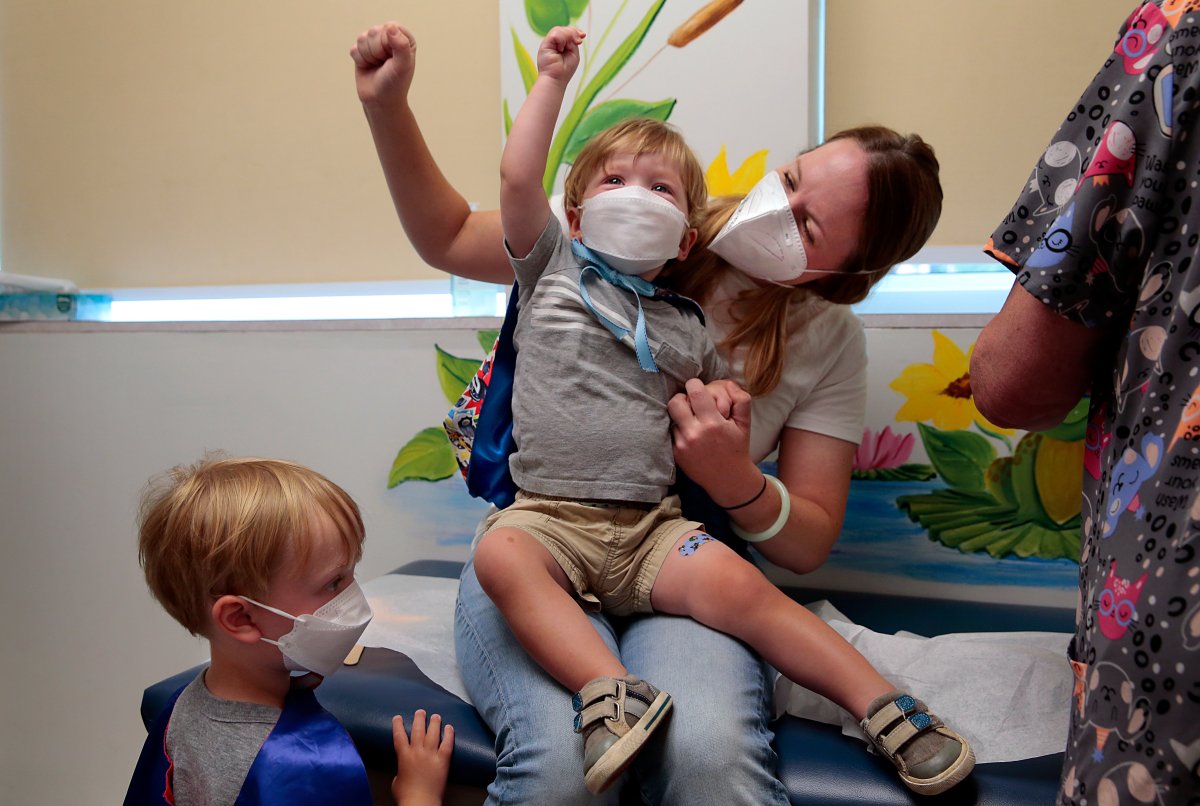Now that Health Canada has approved Moderna’s COVID-19 vaccine for the country’s infants, Erin Morton, a 41-year-old parent of three from Fredericton, N.B., can finally vaccinate the final — and youngest — member of her family.

“It’s a relief,” she told Global News after learning her three-year-old would now be able to get the jab, following in the footsteps of her two other children, seven and nine years old, as well as she and her husband.
“I’m looking forward to being able to vaccinate her like the rest of our family,” she said.
With the approval of the Moderna Spikevax pediatric vaccine, approximately 1.7 million children between the ages of six months and five years old are now eligible for the jab, according to a July 14 statement from Health Canada.
“This will be welcome news to many, many parents across the country who have been eagerly awaiting the opportunity to protect their younger children,” Devon Greyson, assistant professor at the University of British Columbia’s School of Population and Public Health, told Global News.
However, the approval is also anticipated to come with some challenges.
“We know that there can be some concern or extra hesitancy around vaccinating young children and I think that’s what we’re really going to need to focus on — helping people feel confident to get vaccinations for their infants and preschoolers,” said Greyson.
And, when it comes to educating parents, having information come from multiple trusted sources is a good way to build confidence and get questions properly answered, Greyson says.

“Different messages coming from different parties will resonate with different people,” they said.

Get weekly health news
“Health care providers are often very trusted messengers for parents but we also know that religious leaders or other community leaders like teachers or daycare providers can be very influential with parents.”
For Colin Furness, infection control epidemiologist and assistant professor at the University of Toronto’s faculty of information, it’s not just about “shoving a brochure into a parent’s hands.”
Unfortunately, most general practitioners don’t even believe they have the skills to give advice to those who have questions about the jab, according to Furness — who before the pandemic participated in research on doctors and their knowledge and comfort levels in advising vaccine-hesitant patients.
“Most do believe they don’t have the training to be able to answer those questions effectively. It’s not in the curriculum and it’s a complicated conversation to have,” he told Global News.
“Now that we’ve got COVID and a lot more vaccine discourse, that problem is likely worse, not better,” he added.
“It actually does take time and a certain kind of bedside manner and really good listening skills, as well as literacy around what vaccines are made of and what the side effects look like,” he said.
Still, when hearing about the vaccine approval for Canada’s youngest, it felt like a “glimmer of hope,” for Furness.
“It was a sigh of relief. This is a milestone. It’s a big deal,” he said.
“What I want people to understand is we believe the vaccine is incredibly effective at preventing serious disease in these very, very small and vulnerable children.”

As stated by Health Canada, the vaccine given to children in this demographic will be one quarter of the dosage authorized for adults in Canada. Due to the smaller dosage size, the risk of side effects will also be less severe for children in this age range, according to Furness.
“I think for people who are worried about safety, that is the smallest thing to be concerned about,” he said.
“The biggest thing to be concerned about, I think, is avoiding severe acute COVID-19 or long COVID-19 in small children.”
Moderna’s vaccine was previously authorized by Health Canada for use in people 18 years of age and older on Dec. 23, 2020. Subsequently, the vaccine was then authorized for children between the ages of 12 to 17 on Aug. 27, 2021, and children aged six to 11 on March, 17, 2022.
“It’s normal to worry and wonder about how safe the vaccines are for our children. They are our most precious possessions so we want to make sure that we’re doing the right thing,” Nafissa Ismail, professor at the University of Ottawa’s School of Psychology, told Global News.
“It’s important to know that there’s a lot of research done on the safety of these vaccines. We know they are safe. There are countries that have been vaccinating kids for a while now,” Ismail added, referring to the U.S.
Regulators in the U.S. greenlit COVID-19 vaccine for kids under five last month — opening up eligibility to roughly 18 million children in the country.
The Food and Drug Administration’s actions followed its advisory panel’s unanimous recommendations for shots from both Moderna and Pfizer.
“We must protect our children against COVID-19 and I’m just so glad that this vaccination is now going to be available for the younger children,” said Ismail.
As young children begin to be offered their first dose of protection against the novel coronavirus, more Canadians across the country are now also becoming eligible for their fourth shot.
Starting July 14, anyone in Ontario, 18 and older who had their first booster at least five months ago can now book another one.
Other provinces and territories, like Quebec, Prince Edward Island, Nunavut and Yukon, have also opened up their eligibility for second boosters — which would be a fourth dose of the vaccine — to anyone over the ages of 18 and 12, who have waited a certain number of months since their last dose.
The New Brunswick mother of three, Morton, received her fourth jab July 12, as eligibility opened up in her province.
“I’ve taken to the policy of getting the first vaccine each time that is available that I’m eligible for,” she said, noting being fully vaccinated takes some of the “worry” away.
“And, I’m really looking forward to having that layer of protection with my youngest.”
— with files from Global News’ Saba Aziz and The Associated Press










Comments